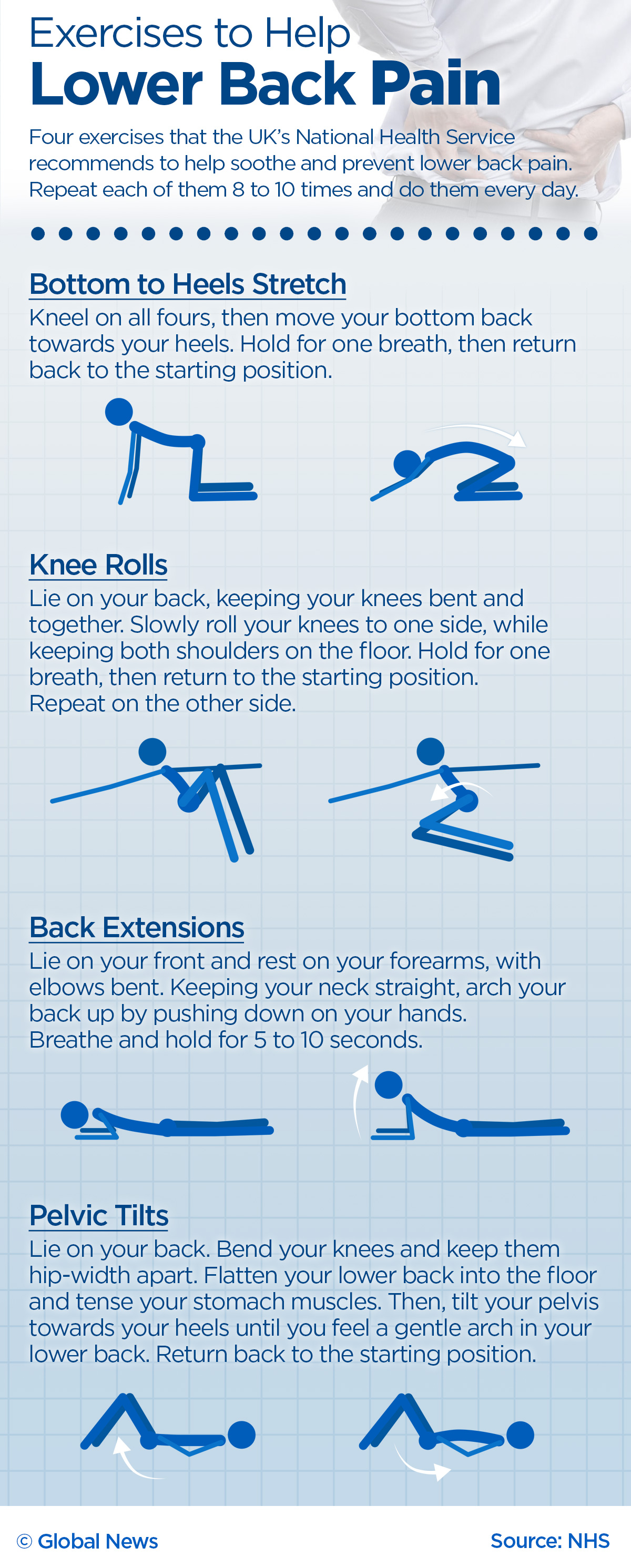When you’re feeling back pain, it can be debilitating.

Some will take over-the-counter medication, while others see a specialist. But some experts suggest many people still ignore back pain until it is too late.
According to the Canadian Chiropractic Association (CCA), back pain is the cause of 40 per cent of work absences, following by being sick.
“Too many Canadians leave their injuries and physical disorders untreated until they are in significant pain which limits mobility and their quality of life,” Sasha Hamid, an associate chiropractor with the CURAVITA Health Group in Ottawa said in a statement.
READ MORE: Is sleeping on the floor actually good for your back? Experts weigh in
Adrian Chow, a chiropractor based in Toronto, says when it comes to back pain, many Canadians don’t take it seriously.
“Back in the day, if you had back pain, medical practitioners would tell patients (who have back pain) to get bed rest,” he told Global News.
“But now we know that’s not the case, because when you do that, it doesn’t help your back — in fact, it makes it worse.”
Back pain can have many ranges
Back pain looks different for everyone. Chow says some people have one-off experiences of back pain or spasms that can be treated at home. Other people suffer back pain after manual labour, working out or even excessively using their back while lifting things up.
But for some, back pain can be chronic.
Mark Erwin, a professor in disc biology at the University of Toronto, tells Global News back pain is a “global burden,” and chronic back pain is a leading cause of disability.
READ MORE: What causes back spasms, and how to treat them
The definition of chronic back pain can vary and it can last three to six months. “The causes are variable,” he continued.
Erwin says it may seem like the problem of back pain may be getting larger, but there are several reasons for this. For starters, there are more people around the world in general, which typically means more cases.
“We’re better at tracking (back pain),” he continued. “It was probably always this way, we didn’t realize it before.” He adds while we are more sedentary in North American countries, people in Africa actually suffer the most from back pain. “Part of the issue is sedentary lifestyle… but also (the lack) of physical education.”

Erwin stresses there is not enough emphasis on the importance of staying active in Canada, in fact, he believes our government should be doing a better job encouraging people of all ages to stay active.
“These days people don’t have time or choose not to prioritize it.”
The risk of not conditioning your back
Chow says most of the people that he sees in his clinic who suffer from chronic back pain don’t focus on conditioning their back.
He realizes being sedentary in an office space limits how much you can exercise your back during the day, but for those in pain, it should be a priority.
READ MORE: Got a pain in the neck? Here’s how to treat it
“As a result, our muscles in the back become de-conditioned, meaning they get weaker because they are not utilized,” he continued.
And when you are looking for treatment options, it is important to actually focus on the back. Some of these exercises (listed below) include bottom to heel stretches, knee rolls and pelvic tilts.
Chow says most people know what they have to do to treat back pain, but they fall into cycles of pain.
“You have back pain but you’re afraid to move because of the pain. It becomes chronic over time. Your chances of developing other chronic diseases like diabetes, heart disease, cholesterol, blood pressure — all that increases as well.”
It is also important to note a lot of back pain, Erwin says, has nothing to do with a lack of exercise. For some, it is genetic and for others it can even be caused by smoking.

“In essence, the discs in your spine don’t have any blood supply, almost like a fingernail,” he continued. “They get nutrients and gases in and out from the vertebrae above, which is full of blood.”
He explains between the vertebrae and the disc there is a very thin cartilage shelf called the endplate. When people smoke, their arteries get clogged, meaning over time, there are less nutrients and gases reaching the disc.
Pain itself is scary
Erwin says the pain itself can also prevent people from getting better. If exercise is the solution, most people can’t even attempt to walk or go to the gym if they are in too much pain.
“Some become disabled by the fear of the pain,” he said. He says cognitive behavioural therapy has helped some people go through the feelings of pain itself and some of the larger fears attached to it.
READ MORE: We’re treating lower back pain all wrong. Here’s how to do it right.
Both experts agree this still comes down to awareness. Erwin says in the past having back pain often lead to be shamed — and some people didn’t want to talk about it altogether.
Chow says education starts at a young age. He looks at examples of brushing teeth — something that is ingrained in people at a very young age. He wonders why back exercises or stretches and staying active altogether isn’t the same.
“We have a spine, we need to do things to maintain it and prevent problems,” he said. “As a society, there wasn’t much emphasis involved in this type of preventive thinking for our backs and spine.”
— with a file from Leslie Young





Comments